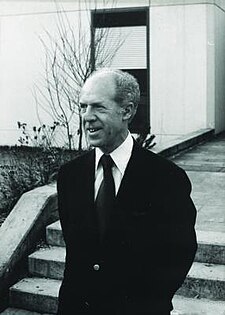Gérard Debreu
| Gérard Debreu | |
|---|---|
 |
|
| Born |
4 July 1921 Calais, France |
| Died | 31 December 2004 (aged 83) Paris, France |
| Nationality | French |
| Institution | University of California, Berkeley |
| Field | Mathematical economics |
| School or tradition |
Walrasian economics |
| Alma mater |
École Normale Supérieure University of Paris |
| Doctoral students |
Graciela Chichilnisky Beth Allen Larry Jones Marcus Berliant |
| Influences |
Léon Walras Henri Cartan Maurice Allais |
| Influenced |
Jacques Drèze Stephen Smale |
| Contributions |
General equilibrium utility theory topological methods integration of set-valued correspondences |
| Awards | Nobel Memorial Prize in Economics (1983) |
| Information at IDEAS / RePEc | |
Gérard Debreu (French: [dəbʁø]; 4 July 1921 – 31 December 2004) was a French-born American economist and mathematician. Best known as a professor of economics at the University of California, Berkeley, where he began work in 1962, he won the 1983 Nobel Memorial Prize in Economics.
His father was the business partner of his maternal grandfather in lace manufacturing, a traditional industry in Calais. Debreu was orphaned at an early age, as his father committed suicide and his mother died of natural causes. Prior to the start of World War II, he received his baccalauréat and went to Ambert to begin preparing for the entrance examination of a grande école. Later on, he moved from Ambert to Grenoble to complete his preparation, both places being in Vichy France during World War II. In 1941, he was admitted to the École Normale Supérieure in Paris, along with Marcel Boiteux. He was influenced by Henri Cartan and the Bourbaki writers. When he was about to take the final examinations in 1944, the Normandy landings occurred and he, instead, enlisted in the French army. He was transferred for training to Algeria and then served in the occupying French forces in Germany until July 1945. Debreu passed the Agrégation de Mathématiques exams at the end of 1945 and the beginning of 1946. By this time, he had become interested in economics, particularly in the general equilibrium theory of Léon Walras. From 1946 to 1948, he was an assistant in the Centre National de la Recherche Scientifique. During these two and a half years, he made the transition from mathematics to economics. In 1948, Debreu went to the United States on a Rockefeller Fellowship which allowed him to visit several American universities, as well as those in Uppsala and Oslo in 1949–50.
...
Wikipedia
